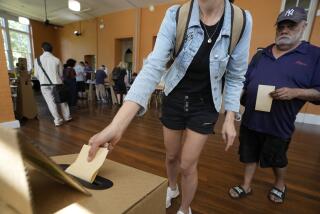CANADA : Unity Plan Pleases Few : Rough draft of reforms has rough going as target of westerners and Quebec separatists alike. Negotiators will try to reach a compromise by next month.
- Share via
TORONTO — Canada’s laboriously crafted national unity program is only a week old, but already it appears to be in trouble.
The program--actually a package of rough-draft constitutional amendments--is supposed to knit Canada’s divergent regions back together. It is also meant to persuade the French-speaking province of Quebec to call off a referendum on sovereignty scheduled for October.
Over the past week, the package has elicited a few kind words, but mostly indignation from the interest groups it was supposed to appease.
BACKGROUND--Here is what the report would do:
* Recognize Quebec under law as a “distinct society” within Canada.
* Recognize Quebec’s jurisdiction over cultural affairs and job training.
* Open the possibility that Quebec, and perhaps the other nine provinces, would take over as many as 18 governing powers now held by the federal government.
* Acknowledge that Canada’s aboriginal peoples never surrendered the right to govern themselves.
* Reform the discredited Canadian Senate, giving Canadians the right to elect their own senators, who are now appointed. Less populous provinces would get more seats but still wouldn’t have as many as Ontario and Quebec.
* Enshrine a “social covenant” in the constitution, guaranteeing basic economic benefits such as housing, education and health care to all.
* Commit provincial governments to removing the trade barriers they have erected between themselves.
In addition, the report calls for finding some way to ensure that Quebec will have a veto over future constitutional amendments. The drafters were unable to agree on how such a veto would work, though, so they offered five possible mechanisms for further discussion.
UPDATE--Here are some of the reactions from the main interest groups involved.
* Quebec sovereigntists: Not surprisingly, they rejected the package outright; they have been boycotting the national unity talks all along.
Parti Quebecois leader Jacques Parizeau called the proposals “an affront” and “a hoax,” containing far fewer new powers for Quebec than the province had been offered previously.
* Quebec government: Quebec Premier Robert Bourassa is a federalist who has to outflank his province’s sovereigntists if he wants to be reelected. So he didn’t reject the package outright, but he didn’t embrace it either.
* Western Anglophones: Politicians in the west say they will fight to the finish any move to give Quebec a veto over constitutional amendments.
Preston Manning, leader of the west’s fast-growing, populist Reform Party, said that the government had “flunked” its efforts at Senate reform.
* Native peoples: Canada’s aboriginal groups are pleased that the package would guarantee their right to self-government. But they are worried that the report’s other provisions could undermine that newfound right.
What good does it do, they ask, for Canada’s native peoples to achieve new powers vis-a-vis the federal government, if at the same time, the federal government is weakened?
* The general public: A recent poll by Gallup Canada shows that 92% of non-Quebec Canadians reject giving special powers to Quebec, and 51% disapprove of calling it a “distinct society.”
OUTLOOK--What happens next:
Ministerial-level negotiators from nine of Canada’s 10 provinces must now start meeting with the federal government, to see how the document can be made more palatable.
Bourassa is refusing to attend the negotiations, but he has agreed to send civil servants as observers.
Assuming the negotiators can reach a compromise, a final version is to be unveiled in mid-April.
More to Read
Sign up for Essential California
The most important California stories and recommendations in your inbox every morning.
You may occasionally receive promotional content from the Los Angeles Times.












